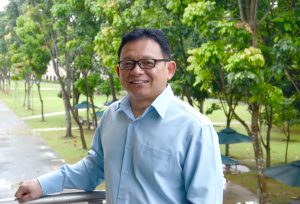Young Children’s Voices in Mathematical Problem Solving
Contributed by Dr Ho Siew Yin and Sng Wei Qin Abbie, from NTUC First Campus, for SingTeach Virtual […]
Read More
How can outdoor learning be made engaging and meaningful for students? This issue’s Guest Editor Professor John Wang believes this comes down to having adequate preparation. To help educators make the most of their outdoor programmes, he shares his research into the factors that contribute to fruitful outdoor learning experiences.

John believes that outdoor education is more than just going for adventure camps or incorporating outdoor activities into PE lessons.
“The benefits of going outdoors are highly touted,” shares Professor John Wang from the Physical Education and Sports Science Academic Group. Research has shown that outdoor eduction can promote physical health and mental health, such as reduce stress, increase happiness and encourage self-discovery.
Outdoor programmes in school, such as adventure camps also build resilience and character through mental and physical challenges. The process of overcoming their fears and challenging their limits helps students acquire important life skills including communication and problem-solving skills, and the ability to resolve conflicts.
“This is why I feel that the outdoor component to education is especially important for the next generation,” he says. “With outdoor education, we can create opportunities for them to develop essential traits in life.”
“With outdoor education, we can create opportunities for them to develop essential traits in life.”
– Professor John Wang, Physical Education & Sports Science Academic Group at NIE
Nevertheless, outdoor education is more than just going for adventure camps or incorporating outdoor activities into PE lessons.
Professor Wang expresses that an important but often overlooked factor in outdoor learning is the psychological aspect of it. Many students tend to perceive outdoor adventure camps as tough, even torturous. This can result in fear and an unwillingness to participate even before the programme begins.
“We often hear about the benefits of outdoor education, but fail to understand the process of making it useful through certain basic principles such as mentally preparing students beforehand,” says Professor Wang. “In this, I think we can do more. We should cultivate students’ love for outdoors and seek to allay fears and other negative thoughts of students as much as possible.”
With a view to maximizing student learning during outdoor education, Professor Wang and his team sought to better understand the factors that influence the satisfaction and learning outcomes of students. Although the research he shared is done with PE trainees, some of the findings are highly relevant to students as well.
“Learning and satisfaction is based on personal gain,” shares Professor Wang. In studying the perceived learning outcomes of 343 pre-service PE teachers who attended a 5-day OBS camp as part of their outdoor education training, his team found two important factors that influence how personally useful or valuable participants find such outdoor adventure camps to be.
First, quality of support resources such as the facilities, accommodation, food and equipment used during outdoor camps matters. “We need to ensure that participants are taken care of and supported in terms of food and equipment and so on,” he says. “While the programme can be tough, simple things like ensuring they have enough sleep can improve morale and minimize injury.”
More significant than this, however, is the power of personal involvement in influencing these participants’ learning outcomes and satisfaction. Personal involvement varies from person to person, and is tied to motivation and connectedness to an activity. “It is about whether the participants see value in the camp, and this depends on whether it meets their needs,” says Professor Wang.
While the value of any outdoor programme is ultimately relative to the profile of each participant, the study shows that caring for their well-being can make a difference in how much they learn.
Professor Wang explains, “If we neglect their well-being, the participants will not enjoy the programme or achieve the learning outcomes we hope for. Conversely, participants who see personal value in the camp gain more from it. We should keep this is mind when we prepare Secondary 3 students who will be going for OBS from 2020 onwards.” (See box story below for the learning objectives of the camp for pre-service PE teachers)
“We often hear about the benefits of outdoor education, but fail to understand the process of making it useful through certain basic principles such as mentally preparing students beforehand… We should cultivate students’ love for outdoors and seek to allay fears and other negative thoughts of students as much as possible.”
– Professor Wang, on the importance of managing students’ expectations in outdoor education
To help students derive maximum benefit from outdoor learning, Professor Wang believes the most important thing is to first communicate to them the purpose of the outdoor activities.
One way is to give them sense of what to expect through video clips or photographs showing what previous batches of students have experienced and learnt. Another is by giving them flexibility to choose from several dates when they would like to attend the camp. Sharing sessions with their seniors could also help them see personal value in going for the camp.
“Instead of giving them the impression they will suffer under their seniors or instructors during the camp, the focus should be on enhancing their experience while maximizing their learning. It need not always be a torturous process,” says Professor Wang.
With greater awareness of how motivation and creating a conducive environment can affect learning outcomes, Professor Wang hopes that schools will be better prepared to help students reap the many benefits of outdoor learning.